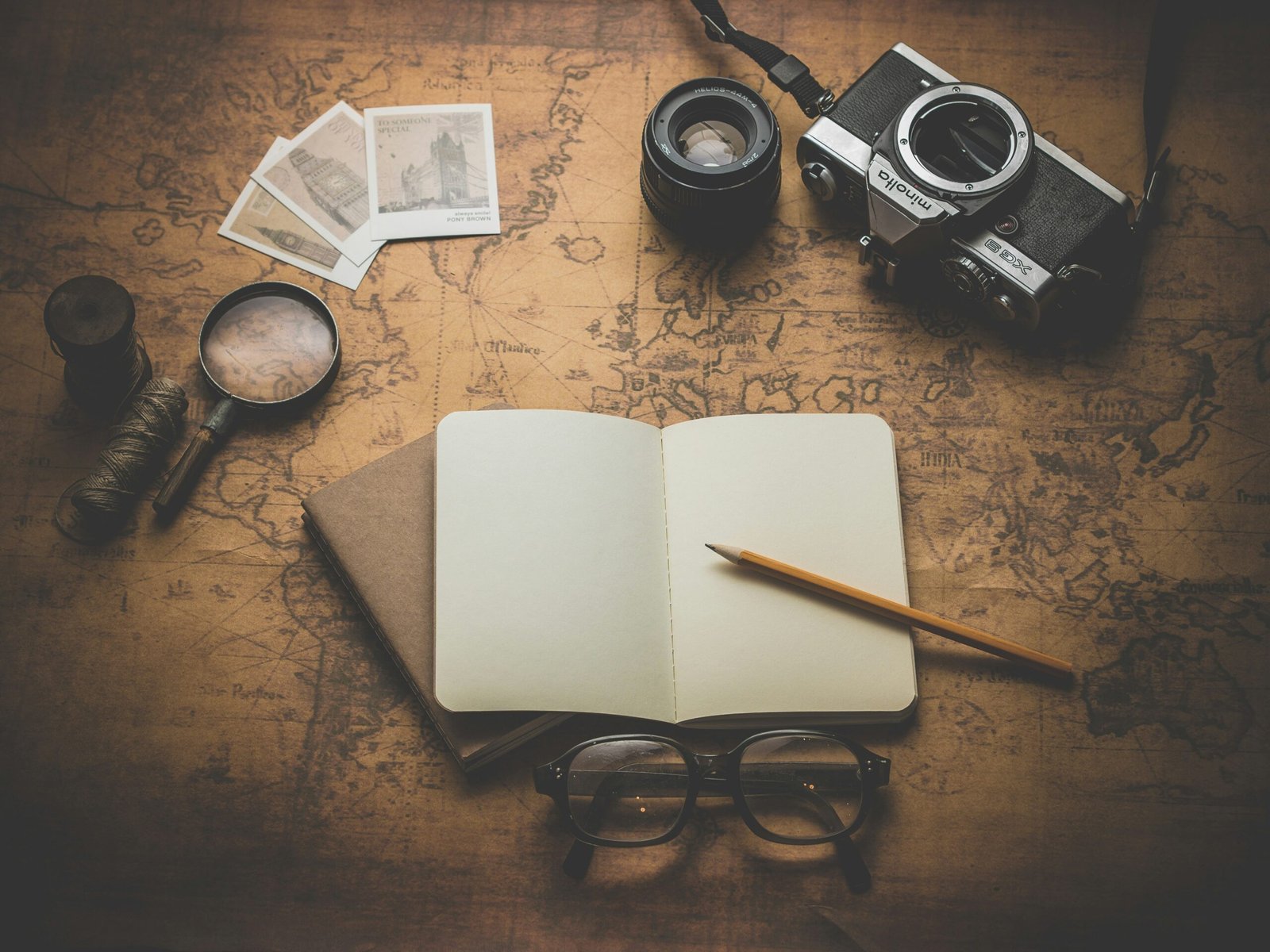Introduction to the Love of Travel
Travel has evolved into a quintessential aspect of modern life, captivating the hearts and minds of countless individuals across the globe. This deep-seated love for travel can be traced back to the innate human desire for exploration and discovery. In an increasingly interconnected world, the allure of venturing beyond one’s familiar surroundings has only grown stronger, offering a unique blend of adventure, cultural enrichment, and personal growth.
The act of traveling allows people to break free from their daily routines and immerse themselves in new environments. Whether it’s the thrill of exploring ancient ruins, the serenity of lounging on a pristine beach, or the excitement of navigating bustling city streets, travel presents an array of experiences that cater to diverse interests and preferences. This multifaceted appeal helps explain why travel has become a significant and cherished part of contemporary life.
Moreover, travel serves as a gateway to understanding different cultures, traditions, and ways of life. By stepping outside of their comfort zones, travelers gain invaluable insights into the world around them, fostering a deeper appreciation for the rich tapestry of human existence. This cultural exchange not only broadens one’s perspective but also promotes tolerance, empathy, and global interconnectedness.
In addition to cultural and experiential enrichment, travel offers numerous benefits for personal well-being. The opportunity to disconnect from the stresses of everyday life, recharge, and rejuvenate is a powerful motivator for many. The physical and mental health advantages of travel, including reduced stress levels, enhanced creativity, and improved mood, further underscore its importance in maintaining a balanced and fulfilling lifestyle.
As we embark on this exploration of why we love travel so much, we will delve into the various facets that fuel our passion for discovering new places. From the psychological rewards to the social connections forged along the way, the reasons behind our enduring love for travel are as diverse and compelling as the destinations themselves.
The Psychological Benefits of Travel
Traveling offers a multitude of psychological benefits that contribute significantly to mental well-being. One of the most immediate advantages of travel is its ability to reduce stress. Stepping away from daily routines and encountering new environments can provide a reset for the mind. Studies have shown that even short-term vacations can lower cortisol levels, the hormone associated with stress. This reduction in stress hormones leads to a more relaxed state of mind, which can have lasting effects well after the trip is over.
Moreover, travel is known to increase happiness. The anticipation of an upcoming trip can boost mood and provide something to look forward to. According to a study published in the journal “Applied Research in Quality of Life,” the mere act of planning a vacation can enhance an individual’s overall happiness. Additionally, experiences gained through travel, such as exploring new cultures, cuisines, and landscapes, contribute to a deeper sense of joy and satisfaction. These enriching experiences create lasting memories that can positively impact one’s emotional state long after the journey ends.
Travel also provides a profound sense of fulfillment. Visiting new places and meeting diverse people can broaden one’s perspective and foster personal growth. The challenges and adventures encountered while traveling, whether navigating a foreign city or trying a new activity, can enhance self-confidence and resilience. This sense of accomplishment and the knowledge gained from new experiences contribute to a more fulfilled life.
Expert opinions and psychological studies further support the positive impact of travel on mental health. According to Dr. Tamara McClintock Greenberg, a clinical psychologist, travel can “disrupt our habitual routines, which helps to refresh our minds.” Similarly, research published in “Personality and Social Psychology Bulletin” suggests that exposure to diverse environments can improve creativity and cognitive flexibility, enhancing overall mental agility.
In essence, the psychological benefits of travel are manifold. By reducing stress, increasing happiness, and providing a sense of fulfillment, travel plays a crucial role in promoting mental well-being. As we delve into new destinations and experiences, our minds reap significant rewards, making travel an essential aspect of a balanced, healthy life.
Cultural Enrichment and Broadening Horizons
Traveling offers an unparalleled opportunity for cultural enrichment and expanding one’s horizons. By immersing oneself in diverse cultures and traditions, individuals gain invaluable insights into the myriad ways of life that populate our world. The educational benefits of travel are manifold, fostering not only a deeper understanding and appreciation of different societies but also nurturing tolerance and empathy.
One of the primary advantages of travel is the exposure to new customs and practices. Engaging with local communities, participating in their rituals, and witnessing their daily routines can significantly expand one’s cultural knowledge. This hands-on learning experience is far more impactful than reading about these cultures in books or watching documentaries. It allows travelers to see, feel, and understand the nuances of different lifestyles, thereby enriching their personal knowledge base.
Moreover, travel often challenges preconceived notions and stereotypes. By interacting with people from various backgrounds, travelers can see beyond superficial differences and recognize the shared human experiences that unite us all. This realization fosters a sense of global citizenship and mutual respect. Understanding that there are multiple ways to approach life broadens one’s perspective, making individuals more open-minded and adaptable.
Additionally, travel can serve as a bridge that connects people across cultural divides. It promotes dialogue and exchange, enabling travelers to learn from others while sharing their own experiences. This cultural interchange not only enhances personal growth but also contributes to a more interconnected and harmonious world.
In essence, the allure of travel lies in its ability to educate and transform. By stepping out of one’s comfort zone and exploring new territories, individuals can gain a wealth of knowledge, become more culturally aware, and develop a broader, more inclusive worldview. These experiences shape our understanding of the world and our place within it, underscoring the profound impact of travel on personal and collective growth.
Adventure and the Thrill of the Unknown
Traveling often sparks a sense of adventure that stems from the thrill of exploring the unknown. The human desire for novelty drives many to venture beyond their everyday environments, seeking excitement in unfamiliar places. This quest for new experiences is deeply rooted in our nature, as we are innately curious beings who thrive on discovery and learning.
For many travelers, the allure of the unknown is irresistible. Whether it’s hiking through dense rainforests, diving into the depths of the ocean, or navigating the bustling streets of a foreign city, the excitement of encountering new sights, sounds, and smells is unparalleled. The joy of experiencing different cultures, trying exotic cuisines, and participating in unique activities adds layers of richness to our lives, making each journey a memorable adventure.
Take, for instance, the story of Sarah, a solo traveler who embarked on a journey to Southeast Asia. She recounted her exhilarating trek through the jungles of Borneo, where she encountered rare wildlife and learned about the indigenous communities. The thrill of navigating through uncharted territories and the satisfaction of overcoming challenges along the way left an indelible mark on her. Similarly, John, an avid adventurer, shared his experience of skydiving in New Zealand. The rush of adrenaline as he leaped from the plane and the breathtaking views of the landscape below were moments he would cherish forever.
These stories highlight the transformative power of adventure travel. By stepping out of our comfort zones and embracing the unknown, we not only satisfy our craving for novelty but also gain a deeper appreciation for the world around us. The thrill of adventure enriches our lives, broadens our perspectives, and fosters a sense of connection with diverse cultures and environments. Ultimately, it is this blend of excitement and discovery that fuels our love for travel and keeps us yearning for more.
Building and Strengthening Relationships
Travel has a unique ability to bring people closer together, whether through family vacations, romantic getaways, or trips with friends. The shared experiences and adventures during travel create opportunities for bonding that are often difficult to replicate in everyday life. One of the primary ways travel strengthens relationships is by providing a break from routine, allowing individuals to focus on one another without the distractions of daily responsibilities.
Family vacations, for instance, offer a chance for parents and children to engage in activities together, fostering a deeper understanding and appreciation of each other. These trips can help family members reconnect, especially in our fast-paced world where quality time is often scarce. Exploring new destinations and cultures together not only entertains but also educates, promoting a sense of unity and shared purpose among family members.
Similarly, romantic getaways allow couples to escape the stresses of everyday life and rediscover their connection. Whether it’s a weekend retreat or a longer holiday, traveling together can reignite the spark in a relationship. The novel experiences and challenges faced while traveling can bring couples closer, as they navigate new environments and make decisions together. These trips often result in cherished memories that strengthen the emotional bond between partners.
Trips with friends also play a crucial role in strengthening relationships. Traveling with friends provides a platform for shared adventures and mutual support. Overcoming travel-related challenges, such as navigating unfamiliar locations or tackling unexpected obstacles, can foster a sense of camaraderie and trust. Additionally, experiencing new places and cultures together can deepen friendships, creating lasting memories that will be reminisced about for years to come.
In essence, travel offers a unique environment where relationships can flourish. By stepping out of familiar surroundings and sharing new experiences, individuals can build and strengthen their bonds, creating memories that will endure long after the journey has ended.
Personal Growth and Self-Discovery
Traveling often serves as a profound catalyst for personal growth and self-discovery. Stepping out of the comfort zone and venturing into unfamiliar territories compels individuals to confront and overcome various challenges, fostering an environment conducive to self-improvement. Navigating new environments, whether it’s a bustling urban metropolis or a remote natural landscape, requires adaptability and problem-solving skills, which in turn bolster one’s confidence and resilience.
One of the most significant aspects of travel is the opportunity it provides for self-reflection. Being removed from the everyday routine allows individuals to gain new perspectives on their lives and aspirations. For instance, someone who embarks on a solo backpacking trip through Southeast Asia may discover a newfound sense of independence and resourcefulness, skills that are not only valuable during travel but also translate to personal and professional spheres back home.
Travel also offers a unique platform for encountering diverse cultures and ways of life, which can significantly broaden one’s worldview. Engaging with people from different backgrounds can challenge preconceived notions and encourage a more open-minded and empathetic approach to life. For example, volunteering in a rural community in Africa can provide profound insights into the simplicity and richness of life, fostering a deep appreciation for different lifestyles and value systems.
Examples of transformative travel experiences abound. Consider the story of an individual who participated in a meditation retreat in India. This immersive experience not only provided a break from the stresses of daily life but also facilitated a deep, introspective journey that led to enhanced mental clarity and emotional well-being. Similarly, a trek through the rugged terrains of Patagonia can test physical and mental limits, instilling a sense of accomplishment and inner strength.
In essence, travel is much more than a leisure activity; it is a powerful tool for personal growth and self-discovery. By pushing boundaries and embracing new experiences, individuals can unlock their potential, gain invaluable insights, and foster a deeper connection with themselves and the world around them.
Economic and Professional Benefits of Travel
Travel offers a myriad of economic and professional benefits that extend beyond personal enjoyment. On a global scale, the travel industry is a major economic driver, contributing significantly to GDPs around the world. Tourism generates employment opportunities in various sectors, including hospitality, transportation, and entertainment, thus supporting local economies. The influx of tourists can stimulate infrastructure development, leading to improved public services and facilities that benefit both residents and visitors.
On a personal level, travel can have substantial economic benefits as well. It provides individuals with opportunities to explore new markets, identify investment prospects, and engage in business ventures. For professionals, travel can be a gateway to career advancement. Attending international conferences, workshops, and trade shows allows for networking with industry leaders and peers, fostering relationships that can lead to collaborations and job opportunities. This global networking is invaluable in today’s interconnected world, where business operations often span multiple countries.
Moreover, travel enhances one’s professional skill set. Immersing oneself in different cultures and environments fosters adaptability, problem-solving abilities, and cross-cultural communication skills. These competencies are highly valued in the global job market, making individuals more competitive candidates. Exposure to diverse working practices and business models can also inspire innovative approaches and strategies that can be applied in one’s own career.
Additionally, travel offers a unique perspective on global issues, enabling professionals to better understand international trends and challenges. This global perspective is crucial for those aiming to work in multinational companies or roles that require a broad understanding of economic and social dynamics. Overall, the economic and professional benefits of travel are multifaceted, offering opportunities for growth, development, and success in a globalized world.
Conclusion
Throughout this article, we’ve explored the multifaceted allure of travel and the reasons it captivates our hearts and minds. We’ve delved into how travel enriches our cultural understanding, fosters personal growth, and provides a sense of adventure and escape from the mundane. It’s evident that travel’s appeal lies in its ability to offer new experiences, foster human connections, and inspire a deeper appreciation for the world’s diversity.
The enduring appeal of travel is deeply rooted in our innate curiosity and desire to explore the unknown. Whether it’s the thrill of discovering new landscapes, the joy of meeting people from different walks of life, or the satisfaction of overcoming challenges on the road, travel continues to be a source of endless fascination and fulfillment. As we journey through life, travel remains a powerful tool for broadening our horizons and enriching our understanding of the world and ourselves.
FAQs
Q: What tips do you have for first-time travelers?
A: For first-time travelers, it’s important to plan ahead and do thorough research about your destination. Make sure to have all necessary documents, such as passports and visas, and consider purchasing travel insurance. Packing light and keeping an open mind can also enhance your travel experience.
Q: How can I travel sustainably?
A: Sustainable travel involves minimizing your environmental impact and supporting local communities. Choose eco-friendly accommodations, reduce plastic usage, and be mindful of your carbon footprint. Supporting local businesses and respecting cultural practices also contribute to more responsible travel.
Q: What are some ways to make the most of travel experiences?
A: To make the most of your travel experiences, immerse yourself in the local culture by trying local foods, learning a few phrases of the local language, and participating in cultural activities. Keeping a travel journal or taking photos can help you capture and cherish memories. Additionally, connecting with fellow travelers and locals can enrich your journey and provide valuable insights.



